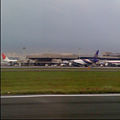Coordinates: 14°30′19″N 121°0′19″E 14.50528, 121.00528
Terminal 1
- Location & Contact Information
- Overview, Photographs, & Video Links
- The development of the Manila International Airport was, finally approved through the promulgation of Executive Order No. 381, which authorized the airport's development. In 1973, a feasibility study/airport master plan was done by Airways Engineering Corporation through a US$29.6 million loan from the Asian Development Bank. The Detailed Engineering Design of the New Manila International Airport Development Project was done by Renardet-Sauti/Transplan/F.F. Cruz Consultant while the terminal's Detailed Architectural Design was prepared by Leandro Locsin's L.V. Locsin and Associates.[1]
- In 1974, the detailed designs were adopted by the Philippine Government and was subsequently approved by the Asian Development Bank on September 18, 1975. Actual work on the terminal began during the second quarter of 1978.[1]
- The terminal was completed in 1981 and had a size of 67,000 square meters with a design capacity of 4.5 million passengers per year. It currently serves all non-Philippine Airlines international flights. In 1989, a Master Plan Review recommended the construction of two new terminals (NAIA 2 and NAIA 3), as well as many other facility improvements.[1]
- The terminal reached capacity in 1991, when it registered a total passenger volume of 4.53 million. Since 1991, the terminal has been over capacity and has been recording an annual average growth rate of 11%. It has 18 airbridges and services 27 airlines (as of July 2006). Interestingly enough, the building does not have a Gate 8 and a Gate 13. Compared to international terminals in other Asian countries, Terminal 1 consistently ranks at the bottom, with limited and outdated facilities, poor passenger comfort, and the facility long ago exceeded its design capacity.[1]
- There are rumors that after everything will be fixed regarding the opening of the new Terminal 3, Terminal 1 will be bought and developed by Cebu Pacific Air for their exclusive use of the terminal similar to Terminal 2 (Centennial Terminal) which is exclusively used by Philippine Airlines.[1]
- Longest Runway:
- Elevation:
Airlines
- International
- Air Macau (Macau)
- Air Niugini (Hong Kong, Port Moresby)
- Asiana Airlines (Busan, Seoul-Incheon)
- Cathay Pacific (Hong Kong)
- Cebu Pacific (Bangkok-Suvarnabhumi, Guangzhou, Hanoi [begins April 10][4], Ho Chi Minh City [begins April 11][4], Hong Kong, Jakarta, Kaohsiung [begins June 7][5], Kuala Lumpur, Macau, Seoul-Incheon, Shanghai-Pudong, Singapore, Taipei-Taiwan Taoyuan, Xiamen)
- China Airlines (Kaohsiung, Taipei-Taiwan Taoyuan)
- China Southern Airlines (Beijing, Guangzhou, Xiamen)
- Continental Airlines
- Continental Airlines operated by Continental Micronesia (Guam, Koror, Saipan, Yap)
- Emirates (Dubai)
- Etihad Airways (Abu Dhabi)
- EVA Air (Taipei-Taiwan Taoyuan)
- Gulf Air (Manama)
- Hong Kong Express Airways (Hong Kong) [begins March 30]
- Hawaiian Airlines (Honolulu) [begins April 17][6]
- Japan Airlines
- Jetstar Asia Airways (Singapore)
- KLM Royal Dutch Airlines (Amsterdam)
- Korean Air (Busan, Seoul-Incheon)
- Kuwait Airways (Bangkok-Suvarnabhumi, Kuwait)
- Lufthansa (Frankfurt) [ends March 30]
- Malaysia Airlines (Kota Kinabalu, Kuala Lumpur)
- Northwest Airlines (Detroit, Los Angeles [begins June 2], Minneapolis/St. Paul [ends June 1], Nagoya-Centrair, Tokyo-Narita)
- Qantas (Brisbane, Sydney)
- Qatar Airways (Doha)
- Royal Brunei Airlines (Bandar Seri Begawan)
- Saudi Arabian Airlines (Dammam, Jeddah, Riyadh)
- Shenzhen Airlines (Nanning)
- Singapore Airlines (Singapore)
- Thai Airways International (Bangkok-Suvarnabhumi, Osaka-Kansai)
- Yemenia Yemen Airways (Dubai) [begins early 2008]
Visitors
- Hotels Nearby
- Restaurant Recommendations
- Places of Worship
Employees
Other Links
References
Gallery


